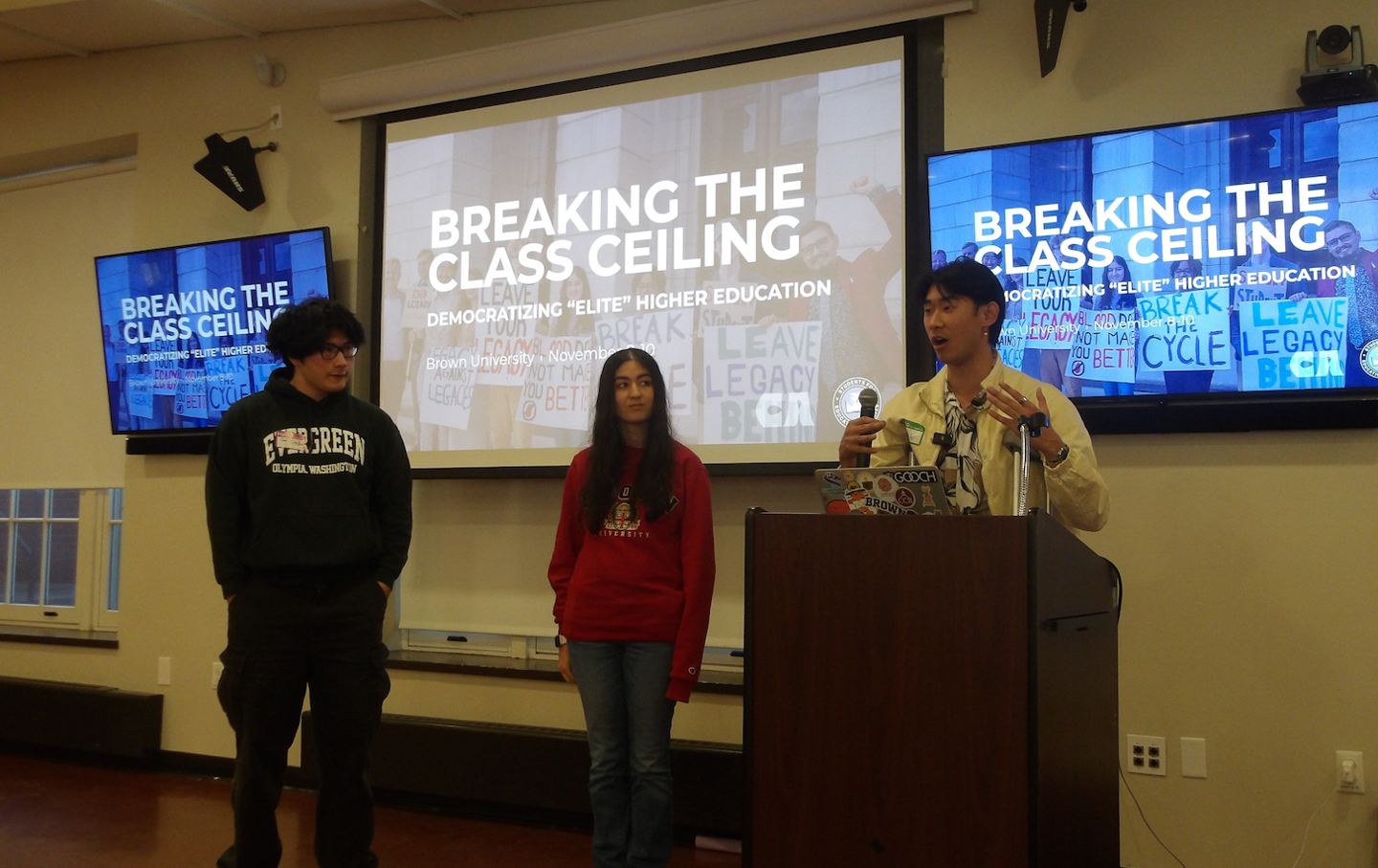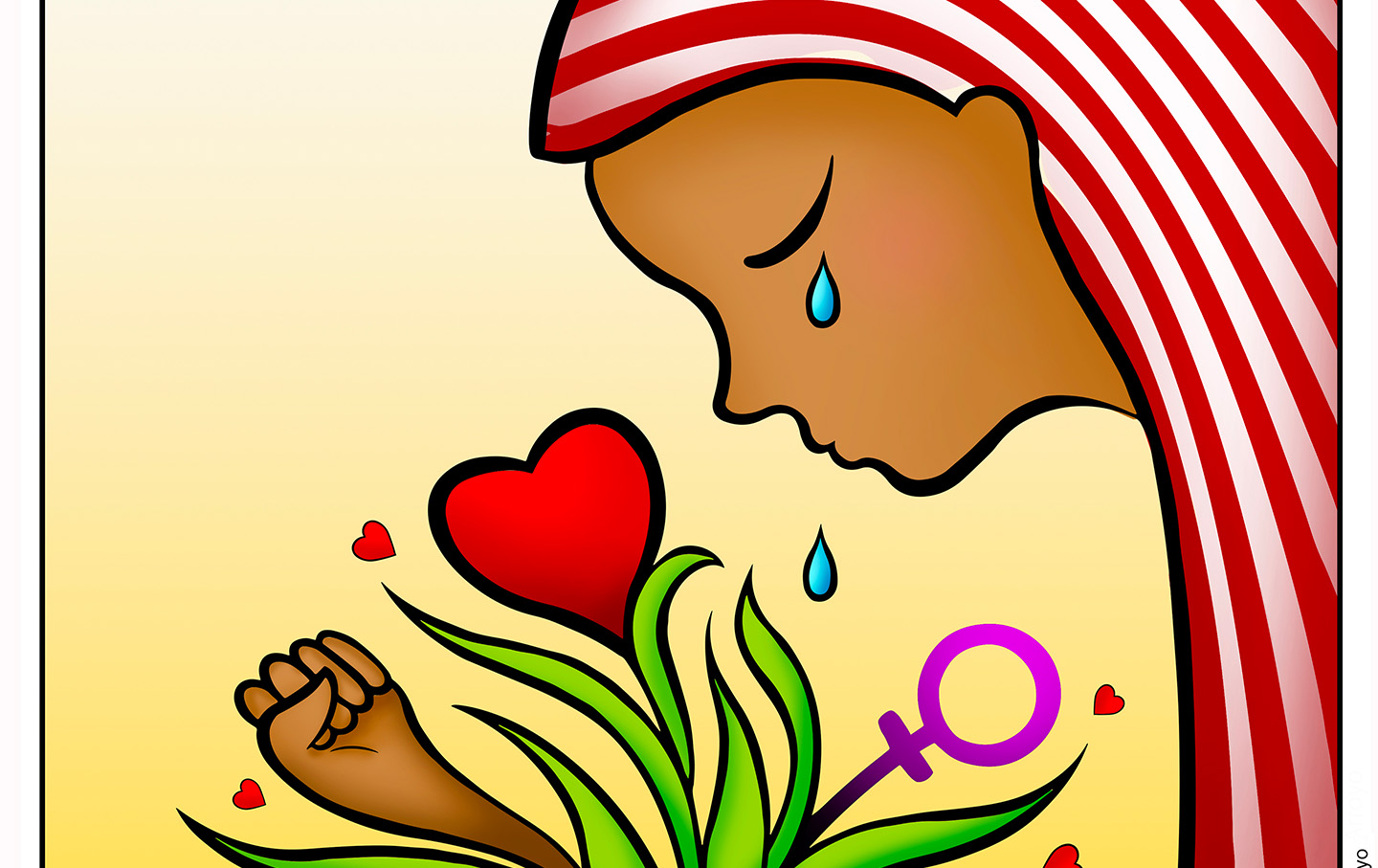The “Friends of the IDF” Gala Was Like a Rich Kid’s Bar Mitzvah—Until the Protest Started
Pro-IDF revelers were getting drunk, dancing, and bidding on VIP passes to Shaq’s Fun House. (Really.) But anti-Zionist Israeli activists had other plans.

It was nearing midnight in New York on Thursday, and the event space at Chelsea Pier 60 was booming with the thunderous sounds of a party.
Pop music blasted so loudly that the whole room vibrated. Throngs of young professionals in their finest suits and ball gowns cheered, danced, and stumbled around drunk. There were balloons hanging from the ceiling, a photo gallery projected on massive screens, even a huge ice sculpture.
The scene resembled nothing so much as a rich kid’s rowdy bar mitzvah—only this one had a very specific theme. The photo gallery was showing pictures of Israeli soldiers. The ice sculpture was a life-size depiction of a saluting soldier. The balloons were blue and white, the colors of the Israeli flag.
That’s because these people weren’t there to celebrate a newly minted teen. They had gathered—in what turned out to be the final hours of the temporary cease-fire between Israel and Hamas—to party and raise money for the Friends of the Israel Defense Forces, a New York–based nonprofit dedicated solely to supporting the Israeli military.
One group of attendees, though, wasn’t in much of a partying mood. Three Israeli women disrupted the celebrations as speeches began, chanting, “Cease-fire now!” They were dragged and shoved out of the room by several security personnel, who pushed them to the ground and forced them out of the building.
These were members of Shoresh, an anti-Zionist activist group made up entirely of Israelis living in the United States. They had bought a block of the cheapest available tickets to the event to try to turn people’s attention away from the party and toward the violence in Gaza—which, as Shoresh founder Hadas Binyamini put it, materially impacts their lives in ways that the American members of Friends of the IDF do not experience. (I was given one of the tickets so that I could attend and report on the event.)
FIDF events have drawn protests across the country over the past month. Over a thousand protesters gathered outside a similar gala in San Carlos, Calif., on November 5. Gala attendees left with police escorts. On November 29, for the first night of FIDF festivities in New York City, groups of protesters made it inside the building, and were threatened by an attendee, who shouted, “Make a move! I dare you! You murderer, you rapist, you coward, you terrorist animal, piece of garbage! You’re nothing but a murderer, all of you!” On November 30, the same night as the Shoresh protest, yet another FIDF event was held in Philadelphia. Organizers met them with a vigil outside.
Ilana Cruger-Zaken, a 36-year-old graduate student and Shoresh organizer, was thrown to the ground by a security officer at Thursday’s gala. “We were stalked by security inside,” she said. “They were following us around. We didn’t even get a chance. We took one step and their hands were on me. They dragged us through the crowd,” she said.
Nonetheless, she knew that had she taken similar action in Israel, the consequences would have been more severe.
“The ability to exercise my right to free speech has become more and more precious to me,” she said.
Elisheva Gavra, 31, disrupted the gala alongside Cruger-Zaken and co-organizer Roni Zahavi-Brunner, 24. Gavra spent most of her life in Israel and only came to the US two years ago. So, Gavra said, she’s seen what happens to those who speak up against the Israeli government within the state.
“They couldn’t do what we do right now,” Gavra said. “Saying the most basic criticism of the war, right now, is interpreted as treason,” she said. A high school history teacher in Israel was put in solitary confinement for four days last week for making Facebook posts showing the names and faces of a few of the 15,000 Palestinians killed during Israel’s assault on Gaza. “Humanizing people is immediately considered as an existential threat. Apart from the moral failure of that, there’s a real failure in terms of people’s ability to use their mind and think independently and freely—that is limited.”

The activists almost seemed more serious about the reasons the gala was happening than the people who were there to show their support. Though IDF iconography was everywhere, and there was a candlelit memorial in the hallway for soldiers who had been killed, the crowd was not inclined toward solemnity.
When gala cochair Lauren Bronstein tried to talk to the crowd about the $50 million the Friends of the IDF has transferred to the army in the past weeks, she couldn’t get people to stop chatting and partying long enough to get the words out.
Popular
“swipe left below to view more authors”Swipe →“Can we get quiet? For like two minutes here?” Bronstein, who also works as an account executive at LinkedIn, snapped into the microphone. “We have some pretty serious things to talk about, that are pretty heavy, so if we can get everyone to be quiet, and remember why we’re here, that would be greatly appreciated. If everyone can just be quiet. I want to hear quiet in the back, on that side, in the middle, we just want to recognize why we’re all here, and it’s pretty heavy, so give us a second.” The crowd quieted down, and the co-chairs showed a video demonstrating FIDF’s accomplishments—providing discretionary funds to specific brigade commanders through their “adopt-a-brigade” program, for example—and featuring young Friends of the IDF members giving a scripted explanation of why they donate to the organization.
“I find it to be my duty to continue to fight for Israel…because it is the one place on Earth that we can feel safe,” one person in the video said. “It is the single most important thing for the survival of the Jewish people…and if we don’t all come together, then who will?”
Friends of the IDF is only one small part of the fundraising apparatus for the Israeli state in New York City. It does not offer the Israeli military financial aid in the purchase of weapons—focusing on armored ambulances, recreation activities like ice cream trucks for the Israeli troops, and other noncombat activities instead. Other New York–based nonprofit groups, such as the US Friends of Ateret Cohanim and the Long Island–based One Israel Fund, funnel military gear to West Bank settler militias.
The money raised by all these groups for the Israeli military, as they are nonprofits, is nontaxable. And it’s a great deal of money: each of these groups nets millions per year in donations. FIDF in particular has a history of aggressive and effective fundraising: “As their only designated partner in the U.S., the IDF requests our urgent support,” the FIDF website reads: It is the signal organization authorized to collect charitable donations on behalf of IDF soldiers in America. In 2022, FIDF had about 137 employees and 600 volunteers, per their tax records, spent $600,000 on their CEO’s salary and millions on travel and consulting, and raised a total of almost $87 million, a quarter of which came from events like the one on Thursday night.
At that gala, the sheer amount of money involved was evident: Gucci bags and Equinox memberships were some of the items on offer at the silent auction, along with “VIP tickets to Shaq’s Fun House” at the upcoming Super Bowl. Names of major sponsors of the event, such as the Kushner real estate group, flashed endlessly on screens. As guests left the gala, they once again had to walk through several layers of security—both private guards and NYPD officers. As I exited the gala, an NYPD officer stopped me and took my photo. He never gave me a reason why.
The members of Shoresh are in a unique position. As Israeli citizens living outside the state of Israel, they can speak more freely than those in their home country. But even here in the United States, that speech is under threat: As of Tuesday, a bill is moving through the House of Representatives that both equates anti-Zionism with antisemitism and directly condemns protest slogans such as “from the river to the sea,” “Palestine will be free,” and “Gaza will win.”
Nonetheless, the members of Shoresh hope to add their voices to the larger Palestinian liberation movement within the United States—and to help bolster left-wing activists within Israel.
“It’s the difference between acting out of solidarity versus acting out of material stakes in the future of what happens there. We think both are important,” Binyamini said. “Part of why we are seeing so many people joining right now in urgency is that it’s becoming clear to a lot of people that we need American left pressure—and we need an Israeli left resisting from the inside. It’s not tenable for these two to not be communicating with each other anymore.”
Some diaspora Israeli leftists have responded to the ongoing genocide in Gaza by renouncing their Israeli citizenships entirely. Others see the Israeli left as something that still has the potential to wield power. To that end, Cruger-Zaken said, Shoresh is in communication with leftists within the borders of the state of Israel as they move forward here.
For Cruger-Zaken, being an Israeli outside Israel offers the chance to see a different path. “I am considered to be a traitor,” she said. Within Israel, Jewish Israelis who criticize the government are sometimes beaten, arrested, thrown in jail, or fired. Palestinians in Israel have been arrested on terrorism charges over their status on WhatsApp. While over 15,000 Palestinians have been killed in Gaza since October 7, Palestinian Arab citizens of Jerusalem and the occupied West Bank have weathered an increase in settler violence too. By and large, the left within Israel has not been able to curb this violence.
That left, however, is a small minority, even in American terms. In a November 10 poll, only 10 percent of Israeli Jews even supported a pause in the fighting to exchange hostages, much less a full cease-fire like the one that international protesters demand. The same poll found that over half of Israeli Jews believed the IDF was using too little firepower in Gaza.
Cruger-Zaken’s family members have told her she is naïve, that she should go to Gaza, that she doesn’t understand what it’s like to be in Israel now.
“They’re right, I don’t live where they live,” she said. “And because I don’t live in that intense environment of Israeli militaristic culture, I have the opportunity to see a different way.” About 70 percent of Israeli youth are conscripted into the military. By calling for an immediate cease-fire and a free Palestine, Cruger-Zaken said, she isn’t working only toward the safety of Palestinians but also toward the longer-term safety of people like her own Israeli family. “It’s my dream to see a future where my cousins aren’t conscripted into permanent militarism.”
By the time news of the end of the cease-fire began to trickle towards America, the FIDF gala attendees were drunk, buying souvenir IDF dog tags, and dancing to Pitbull remixes. Elisheva Gavra said the raucous atmosphere made her wonder if those attending the gala took the deaths in Israel and Palestine seriously at all. “Walking in there, I didn’t think that they really give a shit about protecting Israelis, and that was pretty clear. Why are these people here? Why do they think they’re here? They’re like, delusional. They live in some sort of fantasy.”
“Beyond the politics, how could you have a party right now, in the name of this?” Gavra asked. “People are fucking celebrating. They’re having a party. That was just so corrupt, so disgusting, so detached from reality.”
We cannot back down
We now confront a second Trump presidency.
There’s not a moment to lose. We must harness our fears, our grief, and yes, our anger, to resist the dangerous policies Donald Trump will unleash on our country. We rededicate ourselves to our role as journalists and writers of principle and conscience.
Today, we also steel ourselves for the fight ahead. It will demand a fearless spirit, an informed mind, wise analysis, and humane resistance. We face the enactment of Project 2025, a far-right supreme court, political authoritarianism, increasing inequality and record homelessness, a looming climate crisis, and conflicts abroad. The Nation will expose and propose, nurture investigative reporting, and stand together as a community to keep hope and possibility alive. The Nation’s work will continue—as it has in good and not-so-good times—to develop alternative ideas and visions, to deepen our mission of truth-telling and deep reporting, and to further solidarity in a nation divided.
Armed with a remarkable 160 years of bold, independent journalism, our mandate today remains the same as when abolitionists first founded The Nation—to uphold the principles of democracy and freedom, serve as a beacon through the darkest days of resistance, and to envision and struggle for a brighter future.
The day is dark, the forces arrayed are tenacious, but as the late Nation editorial board member Toni Morrison wrote “No! This is precisely the time when artists go to work. There is no time for despair, no place for self-pity, no need for silence, no room for fear. We speak, we write, we do language. That is how civilizations heal.”
I urge you to stand with The Nation and donate today.
Onwards,
Katrina vanden Heuvel
Editorial Director and Publisher, The Nation
More from The Nation

What Will a Peace Movement Look Like Under Trump’s Second Presidency? What Will a Peace Movement Look Like Under Trump’s Second Presidency?
An all-hands-on-deck approach to the coming world of Donald Trump and crew is distinctly in order.

The Elite College Students Fighting to End Legacy Admissions The Elite College Students Fighting to End Legacy Admissions
In November, organizers at more than 18 universities met for a conference with Class Action to discuss how to democratize higher education.

How Love Fuels Resistance: Parenting for Liberation How Love Fuels Resistance: Parenting for Liberation
Maya Schenwar and Kim Wilson discuss their new anthology, We Grow the World Together, about how caregiving and the organizing work of abolitionists can go hand in hand.

Tell Me What You’re Feeling… Tell Me What You’re Feeling…
Cartoonist Mahasen Al-Khatib killed in Gaza strip bombing.

Patriarchy Has Got to Go Patriarchy Has Got to Go
Check out all installments in the OppArt series.



